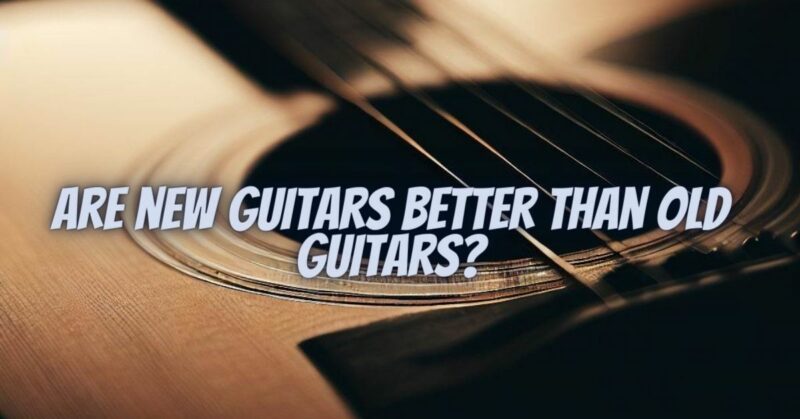The debate over whether new guitars are superior to old ones or vice versa is a long-standing and passionate topic in the world of music and instrument enthusiasts. Some firmly believe that new guitars offer advancements in technology and construction, while others hold the view that the character, tone, and craftsmanship of old guitars remain unmatched. In this comprehensive article, we will explore the various factors contributing to this debate and attempt to shed light on whether new guitars are indeed better than their older counterparts.
I. The Battle of Tradition vs. Innovation
At the heart of the debate lies the tension between tradition and innovation:
- Old Guitars (Tradition): Advocates of old guitars argue that they possess a certain charm and character developed over time. These instruments are often regarded as iconic and are associated with the music of previous generations.
- New Guitars (Innovation): Supporters of new guitars point to advancements in materials, construction techniques, and electronics. They argue that modern instruments offer improved playability, consistency, and a broader tonal palette.
II. The Influence of Tonewood
The choice of tonewood in guitar construction significantly affects its tone and resonance:
- Old Guitars: Vintage guitars may feature aged tonewoods that have undergone physical changes over time. Some players argue that this aging process enhances the tonal character, resulting in a warm, rich sound.
- New Guitars: Modern guitars utilize well-seasoned tonewoods that have been properly cured and aged, often resulting in excellent tonal qualities. Advances in wood selection and treatment can lead to a wide range of tonal options.
III. Craftsmanship and Attention to Detail
Craftsmanship plays a pivotal role in shaping a guitar’s tone and playability:
- Old Guitars: Vintage guitars often benefit from traditional, time-tested construction methods and meticulous craftsmanship. These instruments may exhibit exceptional playability and tonal character.
- New Guitars: Modern luthiers incorporate precision manufacturing techniques and advanced tools to create guitars with consistent quality and playability. High-quality control standards ensure well-crafted instruments.
IV. Electronics and Pickups
Pickups and electronics are critical components influencing a guitar’s sound:
- Old Guitars: Some vintage guitars are equipped with classic pickups known for their unique tonal characteristics, such as vintage single-coil or humbucking pickups.
- New Guitars: Modern pickups offer a wide range of tonal options, including noiseless single-coils, versatile humbuckers, and advanced active pickups. These pickups are designed to meet the demands of contemporary players.
V. Playability and Comfort
The playability and comfort of a guitar are crucial factors for many players:
- Old Guitars: Vintage guitars may have neck profiles and frets that are less ergonomic compared to modern instruments. Some players prefer the vintage feel, while others find it less comfortable.
- New Guitars: Advances in neck and fretboard design, along with innovations like compound radius necks, allow modern guitars to offer improved playability and comfort for a broader range of playing styles.
VI. Subjective Preferences
Perhaps the most significant element in this debate is the player’s subjective preferences:
- Personal Taste: Guitar tone is highly subjective and dependent on individual preferences. What sounds better to one player may not be the preference of another, making it challenging to definitively declare one type of guitar better than the other.
- Playing Style: The style of music a player performs and their specific playing technique can heavily influence their preference for old or new guitars.
Are new guitars better than old guitars? The answer, as you may have guessed, is not straightforward. The debate surrounding this topic is influenced by various factors, including tradition, innovation, tonewood, craftsmanship, electronics, playability, and personal preference.
Ultimately, the best guitar for a musician is one that aligns with their musical vision, inspires creativity, and complements their playing style, whether it’s a vintage instrument steeped in history or a modern marvel of innovation. What remains undeniable is that both old and new guitars have unique qualities and appeal, contributing to the rich tapestry of music and ensuring that the debate over their relative merits will continue for years to come.


